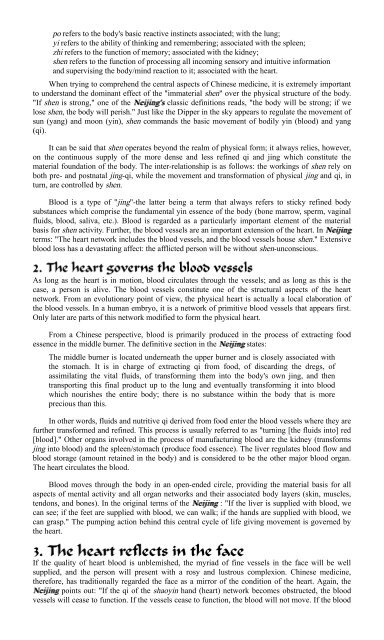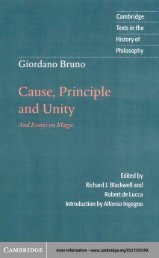You also want an ePaper? Increase the reach of your titles
YUMPU automatically turns print PDFs into web optimized ePapers that Google loves.
po refers to the body's basic reactive instincts associated; with the lung;<br />
yi refers to the ability of thinking and remembering; associated with the spleen;<br />
zhi refers to the function of memory; associated with the kidney;<br />
shen refers to the function of processing all incoming sensory and intuitive information<br />
and supervising the body/mind reaction to it; associated with the heart.<br />
When trying to comprehend the central aspects of Chinese medicine, it is extremely important<br />
to understand the dominant effect of the "immaterial shen" over the physical structure of the body.<br />
"If shen is strong," one of the Neijing''s classic definitions reads, "the body will be strong; if we<br />
lose shen, the body will perish." Just like the Dipper in the sky appears to regulate the movement of<br />
sun (yang) and moon (yin), shen commands the basic movement of bodily yin (blood) and yang<br />
(qi).<br />
It can be said that shen operates beyond the realm of physical form; it always relies, however,<br />
on the continuous supply of the more dense and less refined qi and jing which constitute the<br />
material foundation of the body. The inter-relationship is as follows: the workings of shen rely on<br />
both pre- and postnatal jing-qi, while the movement and transformation of physical jing and qi, in<br />
turn, are controlled by shen.<br />
Blood is a type of "jing"-the latter being a term that always refers to sticky refined body<br />
substances which comprise the fundamental yin essence of the body (bone marrow, sperm, vaginal<br />
fluids, blood, saliva, etc.). Blood is regarded as a particularly important element of the material<br />
basis for shen activity. Further, the blood vessels are an important extension of the heart. In Neijing<br />
terms: "The heart network includes the blood vessels, and the blood vessels house shen." Extensive<br />
blood loss has a devastating affect: the afflicted person will be without shen-unconscious.<br />
As long as the heart is in motion, blood circulates through the vessels; and as long as this is the<br />
case, a person is alive. The blood vessels constitute one of the structural aspects of the heart<br />
network. From an evolutionary point of view, the physical heart is actually a local elaboration of<br />
the blood vessels. In a human embryo, it is a network of primitive blood vessels that appears first.<br />
Only later are parts of this network modified to form the physical heart.<br />
From a Chinese perspective, blood is primarily produced in the process of extracting food<br />
essence in the middle burner. The definitive section in the Neijing states:<br />
The middle burner is located underneath the upper burner and is closely associated with<br />
the stomach. It is in charge of extracting qi from food, of discarding the dregs, of<br />
assimilating the vital fluids, of transforming them into the body's own jing, and then<br />
transporting this final product up to the lung and eventually transforming it into blood<br />
which nourishes the entire body; there is no substance within the body that is more<br />
precious than this.<br />
In other words, fluids and nutritive qi derived from food enter the blood vessels where they are<br />
further transformed and refined. This process is usually referred to as "turning [the fluids into] red<br />
[blood]." Other organs involved in the process of manufacturing blood are the kidney (transforms<br />
jing into blood) and the spleen/stomach (produce food essence). The liver regulates blood flow and<br />
blood storage (amount retained in the body) and is considered to be the other major blood organ.<br />
The heart circulates the blood.<br />
Blood moves through the body in an open-ended circle, providing the material basis for all<br />
aspects of mental activity and all organ networks and their associated body layers (skin, muscles,<br />
tendons, and bones). In the original terms of the Neijing : "If the liver is supplied with blood, we<br />
can see; if the feet are supplied with blood, we can walk; if the hands are supplied with blood, we<br />
can grasp." The pumping action behind this central cycle of life giving movement is governed by<br />
the heart.<br />
If the quality of heart blood is unblemished, the myriad of fine vessels in the face will be well<br />
supplied, and the person will present with a rosy and lustrous complexion. Chinese medicine,<br />
therefore, has traditionally regarded the face as a mirror of the condition of the heart. Again, the<br />
Neijing points out: "If the qi of the shaoyin hand (heart) network becomes obstructed, the blood<br />
vessels will cease to function. If the vessels cease to function, the blood will not move. If the blood

















